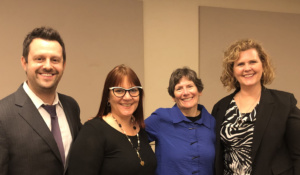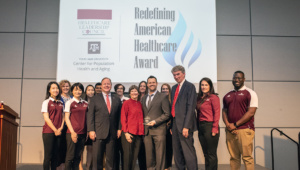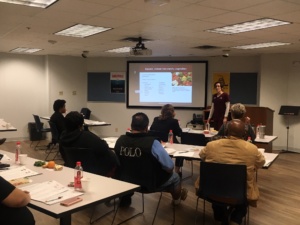Texas A&M Center Promotes Being Active for Life for Everyone,
Every Age, Every Day Through Research, Programs, and Education
Article By | Lauren Rouse Jenkins, TAMU Health Center For Population Health & Aging
With a growing community of retirees in Bryan-College Station, many people don’t know that there is a center dedicated to the benefit of older adults right in their backyard. The Texas A&M Health Center for Population Health and Aging, located in the School of Public Health on the Texas A&M University campus, promotes population health and successful aging through research, community programs, and education.

ABOUT THE CENTER
The Center, founded in 2016, has grown to include a staff of approximately 20 members under the leadership of founding director, Marcia G. Ory, PhD, MPH, and co-director Matthew Lee Smith, PhD, MPH. With a goal of making healthy aging the ‘new normal,’ CPHA wants to change stereotypes about aging and encourage everyone to address the challenges and opportunities of a rapidly aging world. Toward this end, the Center’s research, education, and practice efforts are focused on activities that can make an immediate difference. We are especially interested in social, behavioral, economic, policy, environmental, and technological innovations that positively affect aging individuals, their families, healthcare professionals, and communities. The Center would like the community to know more about the research they are conducting, the programs they are delivering, and their educational activities.

RESEARCH
The Center is actively running several research projects that directly impact those living in the local Brazos Valley, and invites community engagement. For example, Living Healthier with Diabetes examines how diabetes self-management education and support impacts health and health care. The goal is to look at the effectiveness of different kinds of diabetes education for people having trouble managing their diabetes and to better understand how technology might supplement traditional educational approaches. A second study, Technology for Caregiving Assessment Research and Education Services (T-CARES) wants to know how to help family caregivers respond effectively to loved-ones with dementia or memory loss. T-CARES will test the impact of an intervention that helps the caregiver communicate with their loved ones and know where they are in real time. Both of these research projects are actively recruiting participants from the Brazos Valley. If you or someone you know might be interested, visit cpha.tamhsc.edu/projects or email, or call the Center for more information.
COMMUNITY PROGRAMS
Diabetes Education
Affecting more than 30 million Americans, diabetes is a major cause of morbidity and mortality in the United States. CPHA’s focus on diabetes education began several years ago and includes diabetes kiosks and evidence-based programs delivered locally. CPHA has enhanced its diabetes programming by creating Making Moves with Diabetes, an American Diabetes Association recognized program. Through this program, a diabetes team, including a Registered Nurse, Registered Dietitian, and Certified Community Health Worker, give education and support, so that individuals can gain knowledge and skills to better manage their diabetes over a lifetime. In the current COVID-19 era, the program is being delivered virtually.
Dementia Care
With the population aging, the number of persons with dementia is expected to increase dramatically over the coming decades. Higher levels of stress, anxiety, depression, and other mental health concerns are common among family members caring for an older adult and are consistently higher among caregivers for persons living with dementia. The Center’s dementia programming is primarily focused on strategies to reduce caregiving burden. The Center is currently examining the effectiveness of educational programming to build caregivers’ skills; case-management strategies to assist persons living with dementia navigate community resources; environments that help persons living with dementia get around better, and technology solutions to assess real-time changes in everyday activities of daily living and help increase safety.

Falls Prevention
Falls in older adults are commonplace but preventable. To create awareness around this, each fall, the Center hosts a Falls Prevention Awareness Day with local and statewide partners. In the past, the Center has hosted Age Well Brazos, a health and wellness event showcasing older adult-friendly resources. This year, due to COVID-19, events were provided virtually. The Center created a falls prevention place mat for congregate meal delivery sites and distributed them in our local community as well as made them available for the rest of the state to utilize. These placemats included tips on how to prevent falls and resources for older adults. To see a copy of the placemat, go to cpha.tamhsc.edu/fallsprevention.
Opioid Task Force
The opioid crisis has been declared a public health emergency and is only escalating during the COVID-19 pandemic. In fact, the use of prescription opioids is more prevalent among middle-aged and older adults than that of younger adults and can directly or indirectly lead to opioid use disorders. Thus, the Texas A&M Health Opioid Taskforce, an interprofessional group of scholars and practitioners co-located at the Center is dedicated to understanding the appropriate use of opioids and ways to recognize and avoid opioid use disorders among older adults and their families. Through its community outreach and education programs, particularly through the Opioid Overdose Education and Naloxone Administration Trainings, the task force has educated over 500 participants since October 2019. Community groups have included local law enforcement, first responders, public health districts, as well as county officials.
ENLIGHTEN TOGETHER
A growing virtual platform has been developed to provide high-quality and interactive online trainings and distance education. The Enlighten Together education covers a variety of health topics, which can be used to improve population health and enhance the aging workforce. To bring about synergy and strengthen professionals within the clinical, community, and corporate sectors, this training site offers free or low-cost online education. Trainings are directed toward healthcare professionals, community health workers, older adult caregivers, students, and community-based organizations. To view their offered courses and begin learning visit cphatraining.com/training.
“While we are an academic center, CPHA values its many partnerships within the Brazos Valley. Being an active part of the community helps us identify major community concerns and bring solutions that benefit those in need,” Ory said. “Further, the Center recognizes the challenges that older adults and their families are facing during the COVID-19 epidemic.”
Ory’s charge to the community “Please join the Center in its activities and let us know about the aging-related activities you are doing in the Brazos Valley to enhance the health and well-being of older adults.”
To learn more about the Center for Population Health and Aging, visit cpha.tamhsc.edu.
